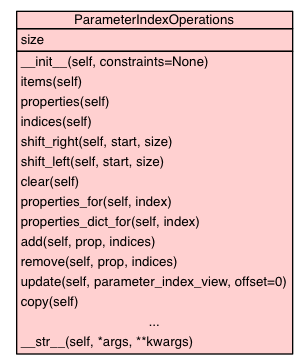
| Home | Trees | Indices | Help |
|---|
|
|

This object wraps a dictionary, whos keys are _operations_ that we'd like to apply to a parameter array, and whose values are np integer arrays which index the parameter array appropriately.
A model instance will contain one instance of this class for each thing that needs indexing (i.e. constraints, ties and priors). Parameters within the model constain instances of the ParameterIndexOperationsView class, which can map from a 'local' index (starting 0) to this global index.
Here's an illustration:
#======================================================================= model : 0 1 2 3 4 5 6 7 8 9 key1: 4 5 key2: 7 8 param1: 0 1 2 3 4 5 key1: 2 3 key2: 5 param2: 0 1 2 3 4 key1: 0 key2: 2 3 #=======================================================================
The views of this global index have a subset of the keys in this global (model) index.
Adding a new key (e.g. a constraint) to a view will cause the view to pass the new key to the global index, along with the local index and an offset. This global index then stores the key and the appropriate global index (which can be seen by the view).
See also: ParameterIndexOperationsView
|
|||
|
|||
|
|||
|
|||
|
|||
|
|||
|
|||
|
|||
|
|||
|
|||
|
|||
|
|||
|
|||
|
|||
|
|||
|
|||
|
|||
|
|||
|
Inherited from |
|||
|
|||
_offset = 0
|
|||
|
|||
| size | |||
|
Inherited from |
|||
|
|||
x.__init__(...) initializes x; see help(type(x)) for signature
|
Returns a list of properties, such that each entry in the list corresponds to the element of the index given. Example: let properties: 'one':[1,2,3,4], 'two':[3,5,6] >>> properties_for([2,3,5]) [['one'], ['one', 'two'], ['two']] |
Return a dictionary, containing properties as keys and indices as index Thus, the indices for each constraint, which is contained will be collected as one dictionary Example: let properties: 'one':[1,2,3,4], 'two':[3,5,6] >>> properties_dict_for([2,3,5]) {'one':[2,3], 'two':[3,5]} |
str(x)
|
|
|||
size
|
| Home | Trees | Indices | Help |
|---|
| Generated by Epydoc 3.0.1 on Tue Jul 4 11:59:32 2017 | http://epydoc.sourceforge.net |